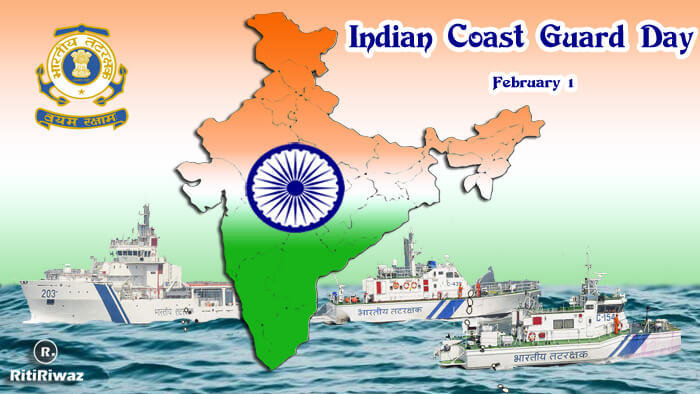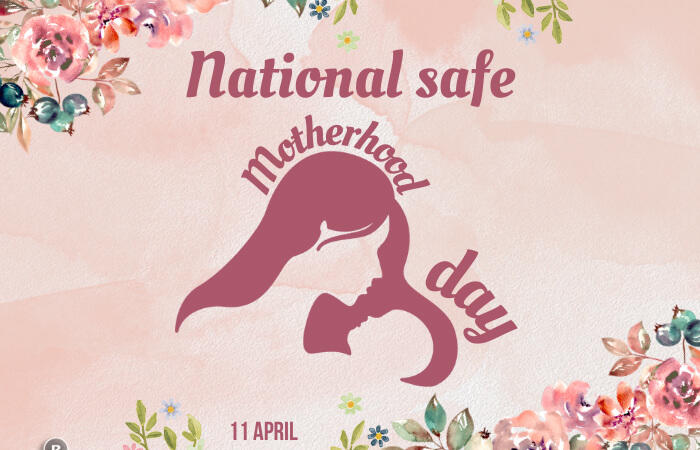Indian Coast Guard Day

Indian Coast Guard Day is celebrated on 1st February every year, it is the foundation day for the Indian Coast Guard (ICG). Indian Coast Guard (ICG) is an armed force of India different from the Indian Navy it protects maritime interests and enforces maritime law. Indian Coast Guard is the fourth largest Coast Guard in the world, it has played a significant role in securing the Indian Coasts and enforcing the regulations within the Maritime Zones of India.
An interim Coast Guard was created on 01 February 1977 which is still observed as the Coast Guard Day though the Coast Guard Act was passed by the Parliament only on 18th August 1978. The Coast Guard’s service terms and conditions on its formation were a mix of some from the Navy and some from the paramilitary forces such as the BSF.
Indian Navy is different
Indian Coast Guard is different from the Indian Navy which has the same base. The Indian Navy is the naval branch of the Indian Armed Forces. The primary objective of the navy is to safeguard the nation’s maritime borders, and in conjunction with other Armed Forces of the union, act to deter or defeat any threats or aggression against the territory, people, or maritime interests of India, both in war and peace.
While the Indian Coast Guard (ICG) protects India’s maritime interests and enforces maritime law, with jurisdiction over the territorial waters of India, including its contiguous zone and exclusive economic zone. The Coast Guard works in close cooperation with the Indian Navy, the Department of Fisheries, the Department of Revenue (Customs), and the Central and State police forces.
Suggested Read: Indian Navy Day
History
The need for the establishment of the Indian Coast Guard was basically first proposed by the Indian Navy, which has been since 1960 constantly requesting the Government of India for setting up an auxiliary service for Maritime Law Enforcement and to provide non-military maritime service to the nation. In 1972, the United Nations Convention on the Laws of the Sea (UNCLOS) awarded Exclusive Economic Zones (EEZ) to all coastal states. Thereafter, the Union of India, enacted the Maritime Zones of India Act 1976, to claim sovereign rights over the vast sea area of the Exclusive Economic Zone.
The reason behind the Indian Navy raising the issue for the establishment of the Indian Coast Guard was basically because of the seaborne smuggling which was turmoil to the Indian economy. To counter this problem the customs department called the Navy for assistance with patrol and interception of smuggling. Thus to fill the gap between the Customs department, central and state police the government agreed upon raising the force we know today as the Indian Coast Guard. The Indian Coast Guard came into existence on 1st February 1977, equipped with two corvettes and five patrol boats. Vice Admiral V A Kamath of the Indian Navy was appointed as the founding Director-General of the force.
Role and Responsibilities
Even in the formative years, the Coast Guard covered itself with glory with interception and capture of boats engaged in the smuggling of silver, gold, and other contraband items. Even in recent times, the Coast Guard units on patrol in India’s Exclusive Economic Zone (EEZ) have been able to apprehend dhows and other craft engaged in smuggling of drugs, red sanders, and other contraband in the Arabian Sea and the Bay of Bengal.
It remains true to its motto “Vayam Rakshamah” (वयम रक्षामः), which in Sanskrit means: “We Protect”, the service has to its credit, saving of 9,700 lives and apprehended 13,200 miscreants since its inception in 1977. On average, the Coast Guard saves one precious life every second day at sea.
They ensure that our seas are safe. They consider that there is no illegal activity in our seas. The Indian Coast Guard also protects the marine environment. They take care of the protection of the marine environment while ensuring the prevention and control of marine pollution. They also look into the affairs of life and property security measures at sea. They also collect scientific data.
Charter of Duties for Coast Guard
- Safety and Protection of Artificial Islands and Offshore Terminals
- Protection of Fishermen
- Assistance to Fishermen in Distress at Sea
- Preservation and Protection of Marine Environment
- Prevention and Control of Marine Pollution
- Assisting the Customs and other authorities in anti-smuggling operations
- Enforcement of Maritime Laws in Force
- Safety of Life and Property at Sea
- Collection of Scientific Data






